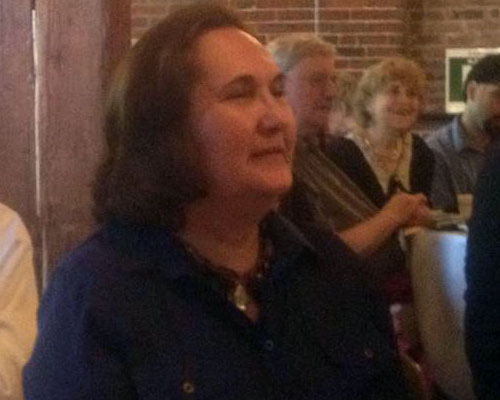Economist and Haverhill homeowner Demet Haksever.
A compromise tax plan was forged by Haverhill city councilors last night. It will bring property tax increases for both homeowners and businesses.
Councilors Michael S. McGonagle and Colin F. LePage spearheaded and shaped the compromise that took two roll call votes to accomplish. In the end councilors voted down Haverhill Mayor James J. Fiorentini’s proposal for a 160 percent classification factor, opting for 156 percent instead in close votes. Average tax increases for both homes and businesses will be about $150. Fiorentini’s plans would have increased taxes on businesses more and lessened the increase for homeowners.
LePage pushed for a vote first on whether to reduce the amount to tax by $600,000. He said this would provide a better understanding of the impact on all taxpayers. McGonagle successfully argued a compromise shift in the proportions paid by businesses and homeowners should result in nearly equal increases. Some councilors expressed concern the $600,000–leftover from an account used to replace money lost through tax abatements–might be needed for emergencies. Councilors Robert H. Scatamacchia and McGonagle voted against using the abatement money to reduce the amount to be paid by taxpayers.
Fiorentini did not offer to cut the city’s record $168 million spending plan, but rather explained this year’s shift in property values caused the current dilemma.
“In this case residential values went up. Commercial and industrial values went up too, but not by as much as residential values.”
Jeffrey G. Linehan, owner of Diversified Business Systems, 144 Hilldale Avenue, said raising taxes on businesses has driven them away—from the city’s 35 percent commercial base in 1976 to 16 percent today. This ultimately causes residential tax increases.
“The average taxpayer is paying $4,194. They’d only be paying $3,355 if we had more commercial property,” he said. “What has caused commercial folks to leave Haverhill is all economics. It just simply costs too much more for commercial folks to be here and, therefore, they left.”
Linehan argued residents are better off in the long run if businesses pick up a greater share of the city’s properties even if they pay the same rate as homeowners.
“It is good; in fact, very good, to leave the tax rate at 150. It will eventually save them (homeowners) in the long run. In all honesty, if we could increase the commercial investment in this city, the residential taxpayer would benefit the most with jobs, lower taxes and better lifestyles,” Linehan said.
Adding to the problem, he said, existing commercial buildings are being converted to subsidized housing.
Economist and Haverhill homeowner Demet Haksever said it is unfair to expect residents to pay more while businesses pay less.
“I don’t think it is fair for the residential property owners to pay over $200 for the average home while the commercial property owners to pay $500 less while the property values for the commercial properties was increasing too,” she told councilors.
She further argued businesses are actually be harmed if consumers cannot afford to buy their products.
“If you shift this increase in property taxes to steer more to the residents here, it is going to have a huge negative impact on the disposable income of the residents here and that will eventually hurt the local businesses.” She said the impact on residents isn’t defined simply by property taxes, but also rising water and other costs.
Voting in favor of the compromise rate were Councilors Scatamacchia, Melinda Barrett, Daly-O’Brien, McGonagle and LePage. Favoring the higher rate, but out voted, were Councilors Scatamacchia, William J. Macek, William H. Ryan and Thomas J. Sullivan. Council President John A. Michitson voted against both rates. If Scatamacchia had not changed his vote, a third roll call would have been required.
Fiorentini pledged not to veto the approved tax rate.


By the way – now we have the wonderful OVER RIDE is property taxes to pay for the new Hunking (which will end up costing the taxpayer much more than we’ve been told) – and and ADDITIONAL PERMANENT increase in property taxes.
A big thank you to all the suckers who voted for the debt exclusion – now you’ll pay even more FOREVER. You’ll never see that exclusion money come back – its gone.
Haverhill is becoming to expensive to live in – especially with moonbats running the city council and Mayors office.